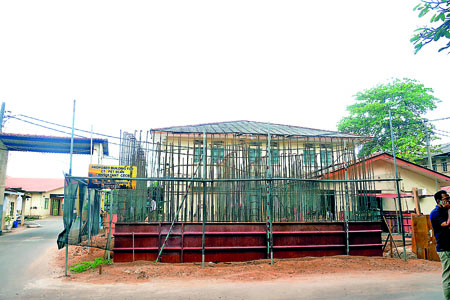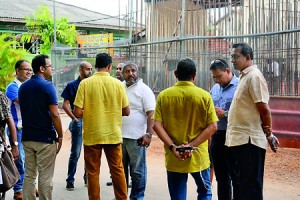Fight Cancer: They came to see the building that would house the PET scan
He was accompanied by one son, while his other was battling illness and lying in hospital. The meeting that Sunday was of paramount importance for the greater good over personal problems, however grave.
He was one among many who knew the agony caused by cancer but there were also others who realized the agony even though no one in their immediate families was affected.

The site of the building
This was the knot of men and women who gathered under the gently-spreading leaves of the Bo-tree at the National Cancer Institute (NCI) at Maharagama on the second Sunday, May 14, spanning the thrice blessed week of Vesak, to witness the building which would house the PET (Positron Emission Tomography) scan machine, which is coming up slowly but surely.
With not a thought for the unbearable humidity, only sometimes dispelled by the soft wind rustling through the Bo-leaves, they saw the construction workers going about their business amidst the iron rods and the concrete. A board at the site announces that the proposed building is for the CT-PET Scan and the consultants are the Central Engineering Consultancy Bureau (CECB) and the contractors Hiru Construction & Enterprises.
While people of all communities, religions and strata of life chipped in with big and small donations, making a collection of a huge sum of Rs. 252 million, even though the plea was only for Rs. 200 million to buy the PET-scan machine (now in the final stages of the tender-process), the Health Ministry has contributed the Rs. 40 million necessary for the special building which would have all six sides, even the ground and roof, of thick concrete. Wijeya Newspapers Limited including the Sunday Times provided major support in the fund-raising efforts last year.
All the money was collected in just under 100 days, with a donation every five to 10 seconds and 73,500 deposits in total from generous people not only around the country but also abroad, reminds Kadijah Foundation’s President M.S.H. Mohamed who spearheaded the programme, pointing out that this gathering at the site was the 129th meeting of his core Fight Cancer team. This team consists of 135 members dubbed Fight Cancer Soldiers with 15 who make the decisions and an active WhatsApp Group.
Mr. Mohamed himself is no stranger to cancer, as his 18-year-old son, Mohamed Humaid, is battling an osteosarcoma (a cancer that starts in the bones). It is with tears and a break in his voice that Mr. Mohamed tells the group that his son has just undergone an amputation of his arm and hand from the shoulder.
Commending each and everyone — doctors, nurses, counsellors and minor staff – of the NCI for their commitment, he recalls how he mobilized social media, collecting 13,000 contacts, to support the cause of equipping the hospital with the PET-scan machine.
Patients are compelled to pay more than Rs. 150,000 each for a PET-scan in the private sector. These scans are considered the gold standard in the diagnosis and treatment of certain cancers such as lymphomas and malignant growths. When a lump or growth is detected, a biopsy is carried out to confirm whether it is a cancer. With that determination, there is a need to check – staging — whether it has spread to other sites of the body through clinical examination supported by radiological imaging.
Currently, clinicians get either a Computed Tomography (CT) scan or Magnetic Resonance Imaging (MRI). But CTs and MRIs, it is learnt, are a little less sensitive and that is why a PET scan comes in handy. Even after initial treatment, a second PET scan helps assess the effectiveness of the treatment and the response of the cancer.
As cancer cells are highly active metabolically and need more energy than normal cells, they take up energy from glucose. Therefore, when taking a PET scan, a radioactive dye attached to synthetic glucose molecules is injected into the patient. Then the cancer cells take the synthetic glucose and the radiological substance lights up. This is why the building housing a PET-scan machine which involves a radioactive dye, has to be of solid concrete.
Meanwhile, Mr. Mohamed and his team will set their sights on providing other essential tools and equipment needed at the NCI, once the PET-scan machine is in place. Citing the example of a modern MRI machine, he says that even though the National Hospital of Sri Lanka has one, there is a waiting list, while in the private sector an MRI costs as much as Rs. 40,000 each. The CT-scanner at the NCI is also an older version and those who seek treatment here will benefit by a modern one. Another need is a genetic laboratory.
Even when the patient is no more, says Mr. Mohamed, tearful relatives are fleeced on hearse-charges by the undertakers, when they have to take their beloved kith and kin from the hospital to their homes.
While the money collected for the PET-scan machine is with the Health Ministry, to continue to support the NCI, Mr. Mohamed hopes to set up a Trust Fund shortly.

Mr. Mohamed and his team
| Kadijah Foundation’s President M.S.H. Mohamed who spearheaded the programme and his core ‘Fight Cancer’ team hold their 129th meeting at the site of the building at the National Cancer Institute (NCI) at Maharagama |


